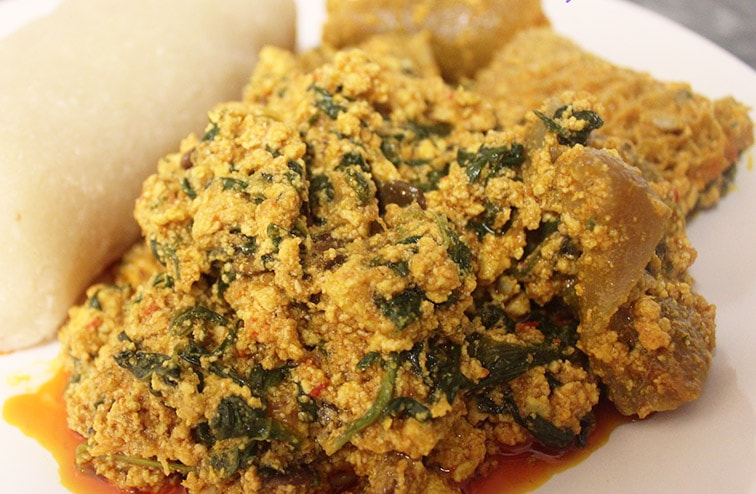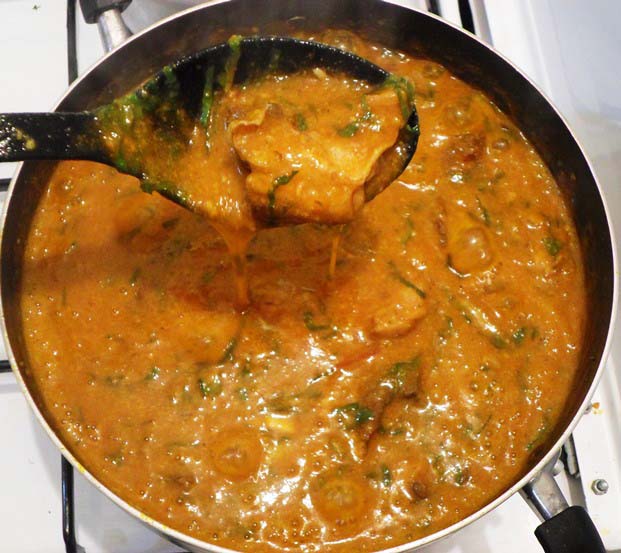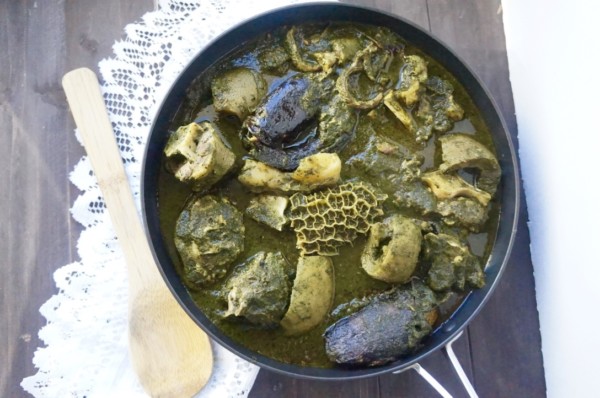1. Pepper-tomato stew
Pepper-tomato stew is a common soup in Nigeria. As you’d have guessed from the name, pepper and tomatoes are the first ingredients you need. Nigerian soups are incomplete without proteins, so you need meat or fish or eggs depending on what you have.
How to prepare pepper-tomato stew in 5 easy steps
- Prepare your chicken stock by adding curry, thyme, seasoning (or nutmeg), salt, and bay leaves. Make a puree of onion, garlic, and ginger. Mix the onion-garlic puree and other seasonings with the chicken.
- Boil for a few minutes. Add some water. Allow to cook for 15-30 minutes. After boiling, separate the chicken from the stock. Use a sieve to filter the stock water. Grill or fry the meat.
- Make your pepper-tomato puree by adding sliced pepper, tomatoes, and onion to a pot. Without adding water, allow it to cook till it gets soft. After cooking, blend the pepper-tomato mixture. Alternatively, you can make your pepper-tomato puree by blending pepper, tomatoes, and onions without cooking first. Then cook for 30-45 minutes to remove excess water.
- Stir-fry onions, seasonings, thyme, and curry in oil for 10–20 minutes. Then add the pepper-tomato puree and chicken stock to the oil. Allow to cook on medium heat for 10-15 minutes.
- Add your chicken, and allow your stew to cook for 10-15 minutes. Bon Appétit! (Note: You can replace the chicken with any protein of your choice)
2. Shoko vegetable soup
Shoko (also called Lagos spinach or Nigerian spinach) is a non-starchy leafy vegetable that’s rich in vitamins and antioxidants that regulate blood sugar levels. Because of its high potassium content, it also lowers blood pressure.
How to prepare shoko
- Blanch your diced shoko vegetables with hot water. Blanching removes dirt and bacteria from vegetable leaves.
- Wash and cut your ponmo and smoked hake fish.
- Blend pepper, tomatoes, and onion. Stir fry the mixture and onion in hot palm oil. During stir-frying, add seasonings, crayfish (optional), locust beans (“iru”), salt, ponmo, and smoked hake fish. Leave it to cook for 10–25 minutes.
- Add the vegetables to the mixture. Allow it to cook for 10–15 minutes.
3. Stewed okra (ila alasepo)

Okra, locally called “ila” or “okuru” in Nigeria, is commonly cooked as ila alasepo in Nigeria. Apart from their spicy taste, okra-rich foods are anti-diabetic because of their high fiber and antioxidant content.
How to prepare ila alasepo
- Dice the okra and pepper and set them aside in separate bowls.
- Wash the goat meat. After washing it, add seasoning, salt, onions, and a little water. Allow it to cook for a few minutes.
- Under medium heat, add palm oil, okra, onions, diced pepper, and stockfish to a pot. Add the neat stock, mix it together, and allow it to cook for 5–10 minutes.
- Serve with any “swallow” of your choice, such as fufu, wheat, pounded yam, etc.
4. Oha soup
The southern and eastern parts of Nigeria are famous for their love of vegetables. Oha, the leaf of the Pterocarpus mildbraedii plant, is one of their finest delicacies. Also called “ora,” it’s packed with fiber, amino acids, and calcium that improve the immune system.
Oha soup recipe
- Prepare the meat stock by adding a seasoning cube, salt, and onion to the meat. Blend the pepper and keep it aside.
- Cook cocoyam (thickener) for 2o minutes. After cooking, peel the cocoyam and blend it into a paste.
- Add palm oil and the blended pepper to the fish stock after 5–10 minutes of cooking. Add water and allow it to cook. Then add the cocoyam paste and locust beans (“iru”) to the soup.
- Add uziza and oha leaves to the soup. Allow the soup to simmer for 5 minutes.
5. Egusi soup.

This is a bit tricky, but hear me out.
N300 – for half cup of egusi. If you can price market well, they will sell it N250 for you.
N100 – Ground pepper (ata gungun)
N100 – crayfish. Crayfish, if they will blend the egusi in your presence. If not, use the money to buy ugu. Ask them to cut it for you. Again, no need for fish. Jesus Christ will multiply your body proteins by God’s grace.
6. Efo riro.

First thing to know: Your efo riro will not look like the one in this photo. There is a difference between efo riro that you photograph for Instagram and the efo riro that you cook with a dash of insha Allahu. It’s the insha Allahu efo riro we want to cook.
N200 – One bunch of vegetables. Ask them to pack bunch generously. Act like you are walking away if they aren’t listening to you. Last last, they will call you back. You know the vibes.
N100 – Locust beans.
N100 – Pepper.
N100 – Ponmo. You can forfeit locust beans for smoked fish.
Again, I’m saying this with the belief that you have a hoil at home. If not, well, to God be the glory, great things he has done.
4. Ogbono.

N300 – Ogbono seeds.
N100 – Pepper
N200 – panla to give the ogbono flavor.
And if you like you can buy ugu to change taste. Ogbono is quite tricky to prepare sha, but Google it. That was what I did the first time I tried cooking it. It was a bit watery, but it went well with eba.
5. Stew/ ata dindin.

Just use your hand grater for the pepper. The hand makes it smoother.

